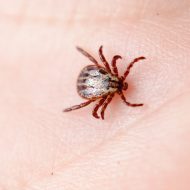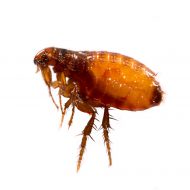Tularemia
Tularemia is caused by the bacteria called Francisella tularensis, that is found in animals such as rodents (squirrels or rats), rabbits, or muskrats. This is a serious disease that can make both humans and animals sick.
Overview
How can I get sick?
Tularemia can enter the body through the skin, eyes, mouth, or lungs.
- Through the bite of an infected* dog tick, wood tick, lone star tick or deer flies.
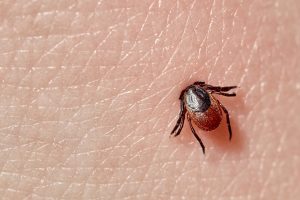
- Touching infected* animals such as rabbits, muskrats or other rodents and then accidentally touching your eyes or mouth.
- Tularemia has also been found in cats and pet hamsters. Do not touch a sick pet and make sure to wash your hands after touching your pets.
- Eating raw or undercooked meat that has the bacteria on it.
- Drinking water that was contaminated* by a sick animal.
Symptoms in humans:
- If you are bit by an infected* tick or deer fly, you may have:
- A skin ulcer (sore) where you were bitten.
- If the bacteria goes into the eye you may feel:
- Irritation (pain) in the eye
- Inflammation (swelling) of the eye
- Swelling lymph glands in the front of the ear
- If you eat or drink contaminated* water/food with tularemia, you may have:
- Sore throat
- Mouth ulcers (sores in mouth)
- Tonsillitis (painful/swelling tonsils)
What can I do to stay healthy?
- Do not drink untreated water such as from a creek or river.
- While hunting or trapping, use gloves when touching an animal or harvesting* an animal.
- Always wash your hands after touching an animal.
- Proper Handwashing – Wash your hands with soap and running water for at least 20 seconds. Make sure to scrub your thumbs, between your fingers and the tops and bottoms of your hands. Dry your hands with a paper towel.
- Always wash your hands after touching an animal.
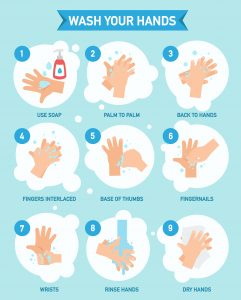
- Always cook wild game meat to the recommended internal temperature.

Before you go outside
- Know where ticks live!
- Ticks live in grassy, bushy, or wooded areas. They also live on animals.
- When hiking or walking outside, try to stay on trails.
- While hunting or trapping, use gloves when touching an animal or harvesting* an animal.
- Ticks live in grassy, bushy, or wooded areas. They also live on animals.
- Hunting, camping, hiking, gardening, or playing outside can bring you close to ticks.
- Treat your clothes, gear (boots, tents, backpacks or camping gear), or any outdoor equipment with insect repellent*.
- Wear long pants, long sleeves, and long socks when outside.
- Use insect repellents* while hiking, camping, hunting, or being outside. Ask an adult to help you with insect repellent*.

Before you come inside after being outside
- Check your clothes, pets, and gear (backpacks, shoes, tents) for ticks before going inside.
- If you have a tick on you, ask for help to have it removed.
- Shower soon after being outside to wash off ticks and do a tick check.
- Check your body for ticks after being outside. Check under your arms, in and around your ears, inside belly button, back of your knees, in and around your hair, between the legs, and around your waist.
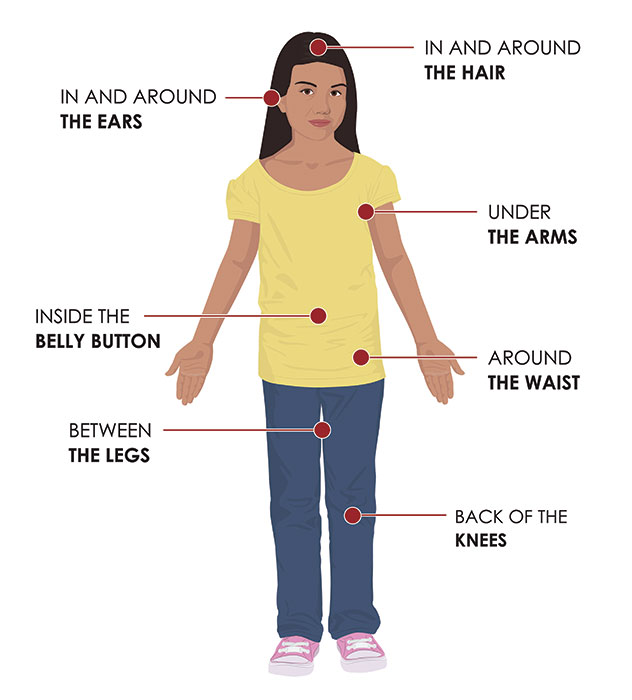
*Definitions:
- Contaminated: When something becomes dirty with germs.
- Harvesting an animal: The process of removing an animal to be used for meat or fur.
- Infected: When germs get inside of a body, animal, or an organism.
- Insect Repellent: Product applied to skin, clothing or surfaces to keep insects away.
Species Affected

Learn About Other Diseases
Click below to learn more about the many different diseases that can spread between animals and humans.
Diseases
